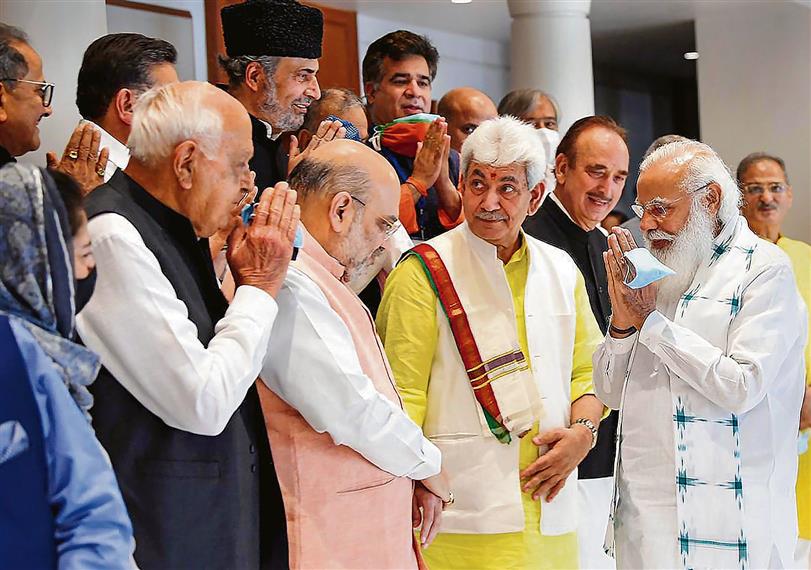
The thaw: The PM’s all-party meeting ought to be seen as a shifting of gears from the campaign mode to the administrative mode. PTI
As the snow melts in the Himalayas, the summer brings in hope of a new beginning in Jammu and Kashmir. The Prime Minister’s all-party meeting on June 24, attended by the important political stakeholders of the troubled Union Territory, has renewed expectations of the revival of the democratic process. And as it always happens in the Valley, this has triggered theories explaining the Centre’s motives, ranging from a nudge from US President Joe Biden to the withdrawal of American troops from Afghanistan. The mistake we often commit is to place J&K in the vortex of the subcontinent’s geopolitics and act and think in terms of the Valley as some sort of prize for subcontinental power games. More than the mainland, the Valley’s mind-readers have mastered this game of second-guessing every political or administrative gesture as a sinister move on the Indo-Pak chessboard, with the Americans as timekeepers — and now, of course, the Chinese too.
We fail to understand that politically, J&K is simply the most important Indian province. Everything that happens or does not happen there has an exaggerated resonance in the kind of politics that successful politicians have been playing in the rest of the country for a long time. The symbolism of the abrogation of Article 370 soon after the second Modi government took oath was proof of the centrality of J&K in the Sangh Parivar politics. In Bihar, UP, Maharashtra, Kanyakumari and wherever else the Sangh Parivar campaigners could gain listeners, they had been talking about the differential treatment of a Muslim-majority territory to drum up electoral support for Hindutva. The visitors from Pakistan wielding automatic weapons and running all over Mumbai’s iconic buildings on live TV only proved the Parivar at least partially right. But this politics of hatred is more suited for campaigning than governance. It seems this realisation, more than anything else, prompted the Centre to invite J&K’s mainstream politicians to sit across the table and talk.
For over eighty years India has been a battleground of two divergent streams of opinion: the Gandhian idea of Indian nationhood in which all communities coexist peacefully to achieve national greatness, and the British plan to balkanise it along communal and caste lines, which was endorsed and promoted by their allies like Mohammad Ali Jinnah. Jinnah succeeded in dividing India, but J&K remained the unfinished agenda of the two-nation theory, which is still being propagated by Islamist separatists, Maoists and their drumbeaters. The abrogation of Article 370, the bifurcation of the state and the creation of two UTs were Savarkarite responses to the two-nation theory — to underscore the idea that J&K was now under Hindutva rule. But Hindus and Muslims as two different nations can only create riots and at worst a nuclear holocaust — they cannot govern. Effective administration calls for Gandhian nationalism of assimilation and reconciliation.
The PM’s all-party meeting ought to be seen as a shifting of gears from the campaign mode to the administrative mode. Strategically and emotionally, J&K cannot be reduced to a UT, it has to remain one of the most important states of the Indian Union; a state for which India goes to war and continues to bleed. Hence, it was a welcome sight to see all the real mass leaders of J&K sitting across the table with the PM and the Home Minister, making just demands on behalf of the people they represent. Thankfully, the Centre has shed its doubts about the real representatives of the people of J&K and has also abandoned its harebrained plan to create a new leadership there. The failure of the Parivar to create its own platform in J&K, Tamil Nadu or Kerala should be accepted as the vibrancy of our inherent diversity and the Centre should not hold it against Indian citizens living in these provinces.
The people of J&K too ought to understand and appreciate their leadership, which suffered incarceration for the sake of their democratic ideals. The local mainstream political leadership — unlike the separatists, who keep looking at Pakistan for investments and instructions — proved true to the people. These politicians have been representing Muslims and Hindus of J&K alike and are Indian nationalists who need to be nourished, not jailed. Sure, there could be corrupt, vile, compromised elements among them — but isn’t that the norm in an electoral democracy? Demonising them is to create a vacuum in which only separatism thrives.
With the China-Pakistan Economic Corridor turning into a subcontinental military arc, India needs effective governance in J&K, not a garrison state. Democracy in J&K upheld by its people who elect their representatives under the Indian Constitution is the best antithesis to Chinese concentration camps in Xinjiang and the Sino-Pak military authoritarianism. If it was the fear of the free India turning against British interests that pushed the colonial administration to create Pakistan (as Narendra Singh Sarila brilliantly argues in his book The Shadow of the Great Game) and prompted Major Brown to raise the Pakistan flag in Gilgit, similar concerns ought to force the US-UK-Japan-EU combine to rethink their strategy for the Persian Gulf and the Indian Ocean.
China is flexing its muscles to establish its hegemony on land and sea encircling India, and also threatening the Persian Gulf. With the US withdrawal from Afghanistan, the possibility of China emerging as a regional hegemon, aided by Putin’s Russia, is very stark. So, beyond the Quad, it is imperative for the Western intelligentsia to stop romanticising religious separatism and to strengthen democratic forces. Democracy won WW-II and it ought to win all future wars, and nothing ensures democracy more than Gandhian inclusiveness.
With the June 24 meeting, the Centre has taken the first step, the next is to restore statehood.
Join Whatsapp Channel of The Tribune for latest updates.




























